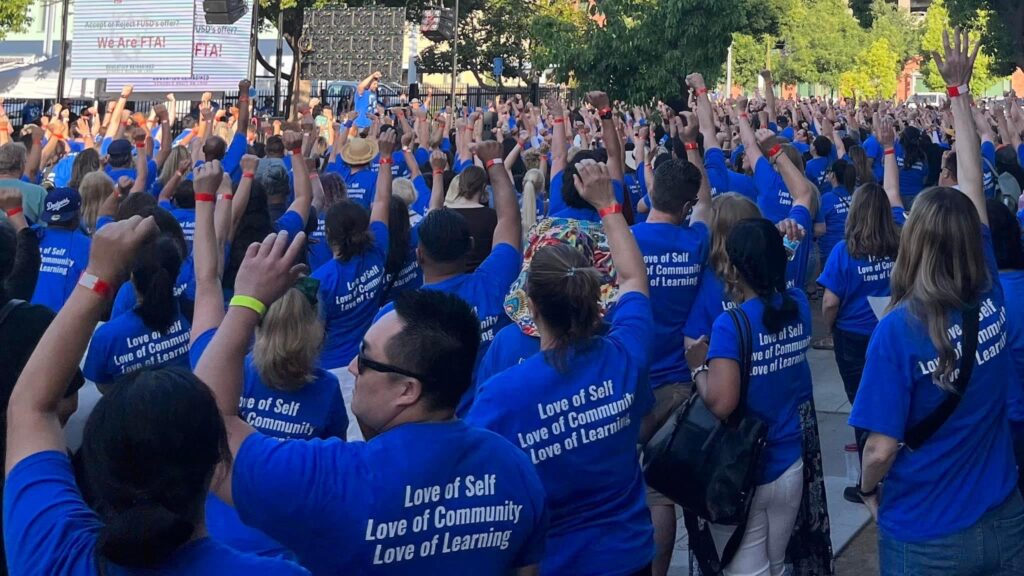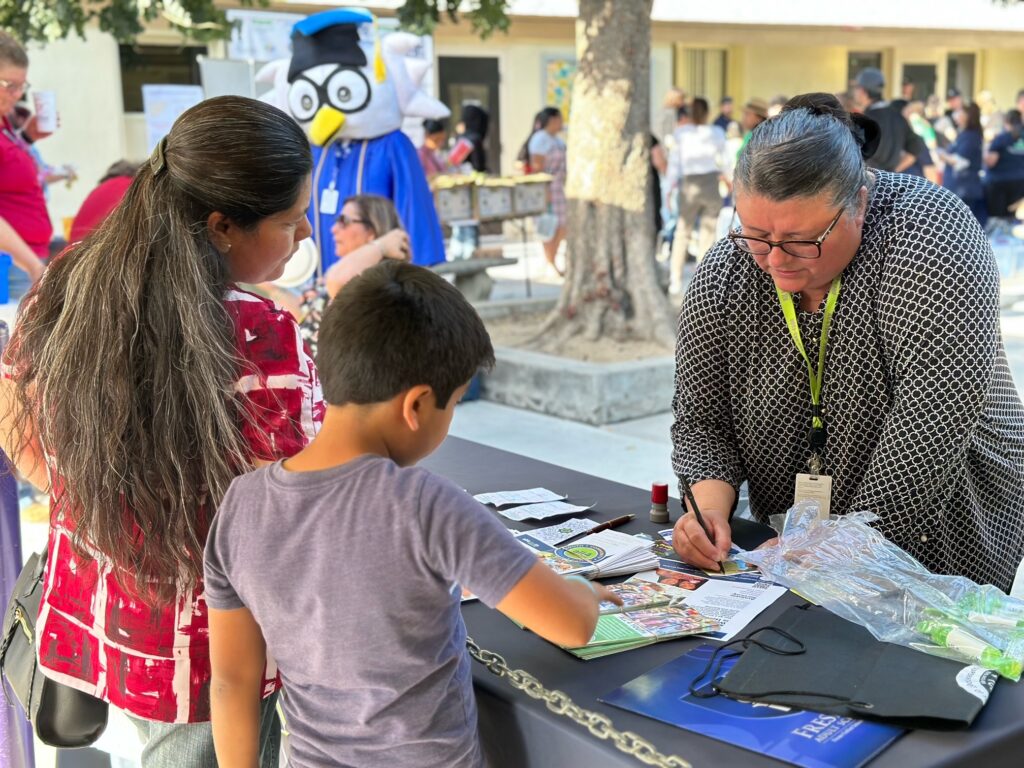
More than a thousand members of the Fresno Teachers Association rallied in late May and vowed to strike if the union and school district fail to agree to a contract by Sept. 29, 2023.
Credit: Courtesy of Fresno Teachers Association
The Fresno Teachers Association swiftly rejected the latest proposal by Fresno Unified Friday because the offer does not raise teachers’ pay enough to keep pace with inflation and cost-of-living increases, union president Manuel Bonilla said.
The district’s offer, which Superintendent Bob Nelson said is “above and beyond” educators’ requests, came only days ahead of Wednesday’s teachers union vote on whether to strike.
“No new investments to reduce class size. No new investments to reduce special education (caseloads). A salary that doesn’t keep up with inflation. They want to cut our healthcare (contribution),” Bonilla said. “Those are the four remaining items we don’t agree on.”
Both the school district and teachers union admit that they’ve failed to agree on “critical” items, such as salary and class size, but Nelson said there’s been “significant progress” with the district’s proposals, including, 19% pay increases over the next three years, expanded medical benefits for the rest of employees’ lives, even after retirement, and changes to class size overages.
“I believe this is a historic proposal for… pay increases and health benefits like we’ve never seen before in Fresno Unified.“ Trustee Susan Wittrup said.
But Bonilla said the Fresno Teachers Association disagrees with the district’s characterization of the offer.
More pay on the table
For salary, the district is now proposing 19% salary increases or 14% in raises and 5% in one-time payments — up from its previous offer of 11% raises.
Over three years, that includes:
- A 8.5% raise this school year
- A 3% raise and a 2.5% one-time payment in the 2024-25 school year
- A 2.5% raise and a 2.5% one-time payment in 2025-26
The 3% and 2.5% raises for the next two school years are contingent on the school district having an Average Daily Attendance (ADA) of 92%, according to the revised proposal. The district’s ADA currently hovers around 92%, district spokesperson Nikki Henry said. If the district doesn’t meet that threshold, the district and union would have to negotiate the raises again. If cost-of-living adjustments increase, so would the raises.
The raises put teachers’ average salary at $103,000, Nelson estimated.
Despite increases in recent years, teacher pay in Fresno and across California still failed to keep up with rising inflation, according to The Fresno Bee.
Plus, starting pay and max salary for teachers in other Central Valley school districts outrank the pay of teachers in Fresno Unified, though the district is the largest in the region, Bonilla said.
Based on Fresno Unified’s pay schedule, salary currently ranges from $56,013 for new teachers to about $102,000 for teachers with loads of experience, not including those with professional development.
Based on a compensation comparison of 16 districts across the Central Valley, data provided by the union, the $56,013 for new teachers and $102,000 max salary rank at the bottom among the other school districts.
Fresno Unified’s proposal also still comes with a cut to how much the district contributes to the healthcare fund, Bonilla noted. The health fund, in part, determines employee healthcare benefits.
The suggested contribution cut saves the district money, which Fresno Unified will use to fund its proposed salary increases, Bonilla asserts.
“They want to reduce the amount of money that goes into our health fund so that they can use some of it to pay for the salary increases,” Bonilla told EdSource.
District’s offer achieves the same thing as lifetime retiree benefits, Nelson says
The teachers union has proposed district-provided medical benefits for the rest of employees’ lives, even after retirement, restoring the practice, which ended in 2005.
Instead of lifetime medical benefits after retirement, Fresno Unified proposes:
- At age 57.5, if an employee has worked in Fresno Unified for 20 years, they’ll be offered the same healthcare plan, and at the same rate, as current employees.
- At 65 when employees become eligible for Medicare, they will have access to a district health plan that covers medical procedures that Medicare doesn’t pay for.
Nelson called the proposal a bridge to Medicare, which will meet the same goal as lifetime retiree benefits.
“What does that mean?” Nelson posed. “If you work for us for 20 years and retire, you will never be without medical coverage.”
The district’s move doesn’t invest more money in teachers, Bonilla argues, because money was already in the healthcare fund to provide what Fresno Unified is proposing. The health care fund has a surplus of money, which will cover the costs of the district’s healthcare proposal.
“The money’s already there,” Bonilla said.
Still no on class size caps
The teachers union wants to cap class size with contract language offering parents the choice of moving their children to smaller classes before the cap is exceeded or giving teachers an increased stipend.
Many districts utilize class size caps or maximums, including Madera, Sanger and Selma school districts in Fresno County.
The district won’t budge on implementing class size caps, Nelson said, but lowering class size is a priority for Fresno Unified.
Maintaining existing class size averages or ratios, the district is proposing reducing the number of students over that average that triggers a teacher stipend.
Currently, teacher-student ratios are one teacher for:
- 24 students in transitional kindergarten to third grade classes
- 29 students for grades 4-6
- 28 students for grades 7-8
- 29 students for high school classes
Elementary teachers have the option of an aide or a $2,000 annual increase if their classes have more than 33 students for more than half of the school year. Secondary grade teachers have the same option of an aide or stipend, if their classes have more than 36 students.
Fresno Unified’s revised proposal reduces that to offer the stipend:
- If K-3 grade teachers have more than 28 students in the 2024-25 school year and more than 27 students in 2025-26
- If 4-6 grade teachers have more than 34 students this year, over 32 next year and more than 31 the following year
- If 7-8 grade teachers have more than 37, 35 and 34 students this year, next year and the following year, respectively
- If 9-12 grade teachers have more than 37, 36, and 35 students this year, next year and the following year, respectively
To help lower class sizes, the district, according to its proposal, will also reassign 50 teachers on special assignment back to the classroom.
And to continue to address class size and other issues, the district is proposing a problem-solving team with four district leaders, including the superintendent, and four FTA leaders.
Even though the union agrees with the concept to create a problem-solving team, Bonilla said negotiations are the time and place to address areas such as class size reduction.
Days ahead of a strike vote
The school district, according to Nelson, is still willing to adjust its proposal based on continued negotiations. Bonilla, too, said he is willing to return to the bargaining table.
“It’s largely dependent on where the district is and how they value their educators,” Bonilla said. “Superintendent Nelson has my phone number, and we’ll be willing to talk anytime, anywhere.”
In the meantime, Nelson and Fresno Unified board members urged teachers to read the district’s current proposal for themselves – especially before voting to strike this coming Wednesday.
When Wednesday does come, teachers’ vote to strike, Bonilla said, could be a vote on whether “enough is enough.”
“We believe that thousands of educators will be able to cast their vote and make their voice heard,” Bonilla said. “We believe that people are ready to strike because enough is enough with a (school) system that devalues our educators and doesn’t listen to the things that they (teachers) feel are needed to improve this system.”



